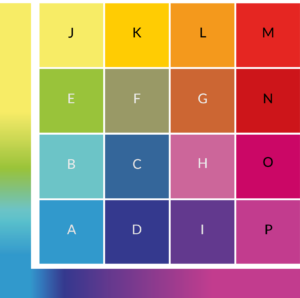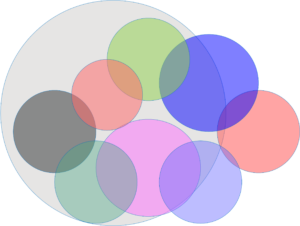Background Reading
On Societal Change
You are welcome to use this matrial. Please be so kind as to credit the author and website.
Societal change
Bernard le Roux
To understand issues that arise in society and in our organisations and in order to make strategic choices as designers and facilitators of dialogue, we need to understand the changes that are occurring in society.
The thoughts that follow have helped us in our understanding of the issues we are asked to deal with and why people react and behave the way they do. We acknowledge that this may be a Eurocentric view of global changes, but as the world becomes more connected and people more mobile, we suggest that the ideas can be applied to developing and developed countries alike.
We are experiencing a transition from a social order dominated by hierarchy and rational thought to one of networking and more integrated thinking. The old era is still dominant and the new is emerging, which means that both are present simultaneously.
In many countries government on all levels is still very much in the old paradigm as are many organisations and family structures. At the same time organisations are changing the way they are organised and led to flatter forms where power is shared. Families are changing as is society.
We can view the shifts that are occurring from many different perspectives. Some describe it from the point of view of power, the nation-state and the move towards globalisation. Others describe how organisations are changing and others how our thinking and consciousness are changing. (Abrahamsson, Holliday, Raskin)
For many decades the nation-state has been sovereign, and power delegated downwards in a hierarchical fashion. People have accepted the decisions of those in power – some more willingly than others. We have relied on reason, expertise and planning. Organisations have had a top-down leadership structure. We now see how the nation-state loses authority as larger entities such as the EU, World Bank and WTO and multi-national corporations gain power. We see how citizens no longer simply accept political decisions and expect to be given real influence. We see how traditional planning reaches its limits and how organisations become flatter and more inclusive. And finally, we see how people begin to express a new way of thinking, moving from the rational to what we will describe as the “not-knowing”.
So, why is this important for facilitators, mediators and negotiators?
The first point is that we are required to move between the two worlds continuously. We may work in government or in an organisation where hierarchy is the dominant mode and then engage with civil society which is increasingly organising itself into networks.
One group does not understand the other. We find that activists and citizens express frustration at the way in which decisions are made and the time it takes to make them. At the same time, officials and political decision-makers are frustrated with the demand for inclusion in decision-making processes or the protests that arise when decisions are communicated. How will these groups talk to each other? What does this mean for dialogue?
Secondly, the challenges we face are becoming more complex as a result of globalization, urbanization and digitalization. Not only do citizens and employees need to adjust to a new reality, but so do our leaders. As a new leadership emerges, it needs to find new ways of including stakeholders in the decisions they make. As individuals and communities take more responsibility and demand inclusion, the need for a more nuanced and co-creative dialogue arises.
Under the old paradigm, it was considered sufficient to inform and (at best) consult with stakeholders. Today we need to consider which kind of dialogue suits the complex challenges we face. We need to do more than to ask: do we need dialogue? Dialogue should be the way we operate, and the question should rather be: what kind of dialogue do we need here?
In order to answer the question of what kind of dialogue we need in a given situation, we have designed a simple tool. The Dialogue Triage is a tool for sorting problems that arise according to two scales: the degree of complexity and the level of conflict escalation.
The level of conflict escalation and degree of complexity are both determined by answering a series of questions. The crossing point for the two scales gives you a code that enables you to get some advice on which type of dialogue is needed, the competency required to facilitate or mediate it, design pointers and some of the risks and opportunities generally associated with this kind of problem.
Here is the Dialogue Triage:

Finally, the way in which people think affects the way in which they interact with others and the way in which they react and contribute to dialogue. First, let us consider the rational thinkers to whom reason is all-important. People and things can be classified, sorted and counted. Processes can be analysed. Decisions are made on a rational basis considering the “facts”. There is a right and a wrong way. Then there are those who see that there is more to the world and to people than the categories and numbers can describe. Each person has a unique history and belongs to a unique system. As people interact, they bear with them their uniqueness and that of the systems they belong to. In this way, systems interact with other systems and nothing can ever be known or predicted with absolute certainty. Art and stories capture some of this world of “not-knowing”.
Consider for a moment how you see these two ways of thinking in your world and how reason has dominated the way we organise ourselves and the decisions that are made. This is more the case in Europe and North America than on other continents. New Public Management has set its mark on the way authorities operate. And importantly, the rational and the integral (if I may call the not-knowing this) manifest themselves in dialogues continuously: Facts vs facts, reason vs feelings. Yet both are needed for us to make sense of our world and to be able to speak about improving it together with others.

Systems affect one another. People belong to systems and are affected by them.
Questions for reflection
Do you notice the societal shifts described above in your own work and in your community? How do they show themselves?
Are you more inclined to operate with a rational or integrated mindset?
Do you notice an adversity or resistance to the changes around us in yourself or in others you work with or meet?
